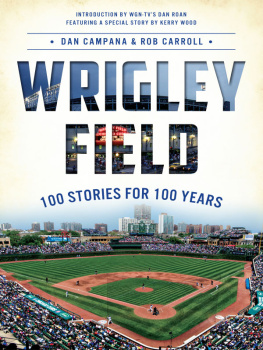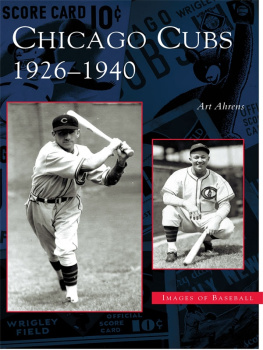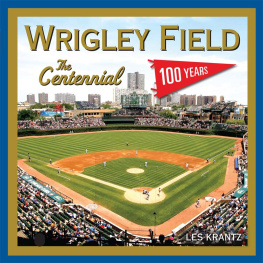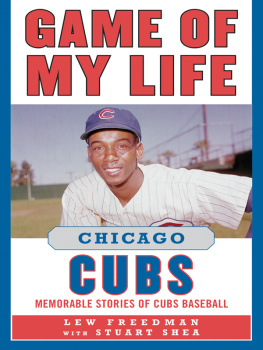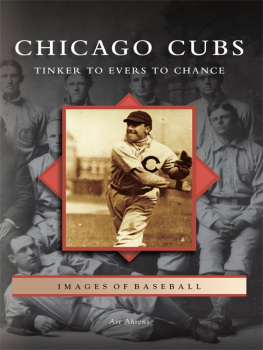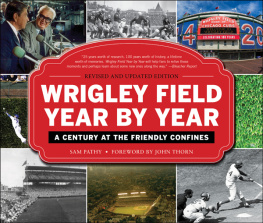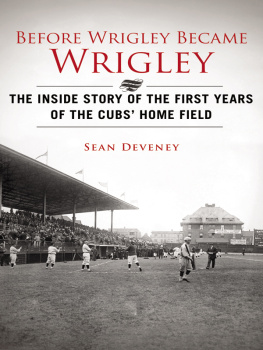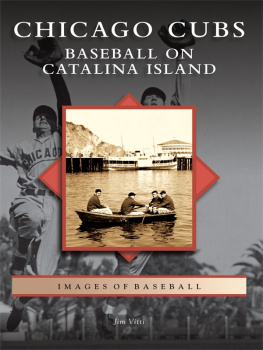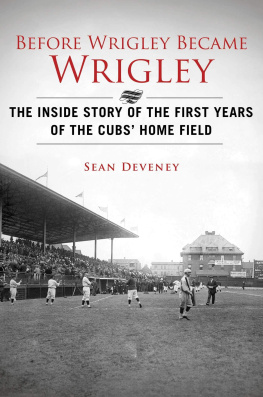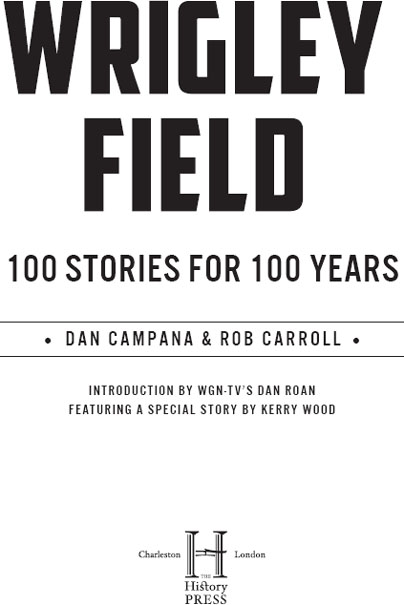
Published by The History Press
Charleston, SC 29403
www.historypress.net
Copyright 2013 by Dan Campana and Rob Carroll
All rights reserved
Front cover, top: Courtesy of Bob Horsch (www.horschgallery.com).
Front cover, bottom: Photo by Dan Campana.
First published 2013
e-book edition 2013
ISBN 978.1.62584.220.6
Library of Congress CIP data applied for.
print edition ISBN 978.1.62619.034.4
Notice: The information in this book is true and complete to the best of our knowledge. It is offered without guarantee on the part of the authors or The History Press. The authors and The History Press disclaim all liability in connection with the use of this book.
All rights reserved. No part of this book may be reproduced or transmitted in any form whatsoever without prior written permission from the publisher except in the case of brief quotations embodied in critical articles and reviews.
CONTENTS
PREFACE
Wrigley Field: 100 Stories for 100 Years is very simply a collection of personal stories about baseballs greatest ballpark and the relationships so many people have with it. The book is designed to offer an informal oral history of what has made Wrigley such a unique part of baseball and Chicago. With millions of Cubs fans around the world, its likely theres at least one story here that you will connect to on some level.

Writers Dan Campana (left) and Rob Carroll became friends in 2000 and attended their first Cubs game together on May 22, 2001, when Todd Dunwoody made a surprise start in right field for Sammy Sosa. Jenkins Imaging.
So, howd they do it? In January 2013, Dan and Rob began sending out requests for interviews to many of the notable names youll find in these pages. Beginning in March 2013, they hit the streets of Wrigleyville to talk with fans, business owners and residents who share their neighborhood with the Cubs. Many interviews were done in person or over the phone, while some stories were collected via e-mail. Every story in the book was either written by Dan or Rob or edited from a requested submission. Although the Chicago Cubs are referenced throughout the book, Wrigley Field: 100 Stories for 100 Years is not affiliated with the team.
ACKNOWLEDGEMENTS
This book would not have been possible without help from many, many people. In particular, wed like to show our appreciation to the following folks who made a big differencein their own special waysduring this project (in no particular order):
Jaime and Matt with Fox Valley Voice; John Horne with the National Baseball Hall of Fame; Paul Johnson; Matt Hanley; Kevin Gregg with the Boston Red Sox; Leni Depoister and Ray Garcia with the Chicago White Sox; Daphne Ortiz with the Wood Family Foundation; Ben Jenkins of Jenkins Imaging; Dana Rogers of Edenhurst Studio (www.edenhurststudio.com); Victoria Kent with Rockit Burger Bar; Shawn Touney with the Kane County Cougars; @HockeyBroad; Paul Ashack (www.paulashackstudios.com); Bob Horsch (www.horschgallery.com); Holly Johns (www.hollyjohnsphoto.com); Brad Hainje and Jim Misudek of the Atlanta Braves; Higgins Tavern on Racine for the beer and parking permits; Fran Sylve; Kristen Taylor; Dennis Meinicke; Sheila Siel; Nancy Tiffen; David Levenson (www.wrigleyfieldvideo.com); Louis Barricelli with MLB Network; Rich Buhrke (www.ballhawksmovie.com); Patrick Yarbrough; Julie Hanson; Jason Zillo, Michael Margolis and Alexandra Trochanowski with the New York Yankees; Tony Andracki with Comcast Sportsnet Chicago; Kerrigan McNeill of the Fergie Jenkins Foundation; Kristen Hudak with ESPN; Mickey and Steve Cucchiaro; Dave Eanet from WGN; Dave Hoekstra; Paul Campana; www.baseball-reference.com; and everyone who liked or followed us on Facebook and Twitter, took the time to talk with us about the book or politely declined our interview request.
As you read the names attached to these one hundred stories, be sure to know we owe them the ultimate gratitude for contributing their time in the variety of ways they did.
Dan also wants to say a special thank you to his loving familyJen, Ryne and their little dog, Kanerfor letting him run an office from their kitchen table and for never expecting him to be anyone other than who he is.
Dan and Rob would like to recognize generous support of the project by Becky Evers, Julie Hanson, John Hanson, Mary Pacyniak, Nancy Tiffen, Diana Williams, Becca Broda, Peter Wilhelmsson, Jim Sowizrol, Jim and Laurie Strong, Grandma Strong, Joseph Zink, Mary Newton, Robs mom, Matt Riddle, Tina Rossini, Holly Johns, Matt Junker, Justin Corbett, Sean Pierce, Thad McGlinchey, John Bayler, Ricky Hendrick, Chad Anderson and Patrick Yarbrough. Thank you so much. We couldnt have done it without you.
INTRODUCTION
DAN ROAN, WGN-TV SPORTS DIRECTOR
I grew up a Cubs fan in Iowa, crying from afar over the collapse of 1969, lamenting the College of Coaches experiment before that and wondering thenas nowwhen the law of averages might finally kick in for these guys. Living at a distance from Chicago, I had no exposure to Wrigley Field as a kid. But I would make up for lost time.

For decades, no advertisements appeared within the playing area at Wrigley Field. That began to change most noticeably in the 2000s, when ads showed up on outfield doors, on the fields tarp cover and on various spots on the famed brick walls. Dan Campana photo.

A panoramic view of the crowd at Cubs Park on July 27, 1929. Library of Congress.
One of my early experiences at Wrigley centered on a hard Friday night of partying, post-college, in Chicagos western suburbs. Ten of us were going to the game on Saturday afternoon, but having only a vague concept of time that morning, I showed up at the ballpark at 8:00 a.m. Owning some status as a downstate broadcaster, I wangled a press pass and spent a couple hours exploring the confines. Eventually, I sat down in the Cubs dugout, where the morning sun and the short night got the best of me. I dozed off, only to be awakened by a sharp pain in my right side. It was Bill Buckner, sticking the money end of his bat into my ribcage and telling me to get the hell out of the dugout.
Today, having covered the Cubs for over three decades for WGN-TV, Wrigley Field and I are old buddies. I was there in 84 for the first postseason games in thirty-nine years, I watched as the lights went on in 88 and I suffered through the dead years of the 90s and suffered even more in 2003. But it was the times in between that made me really appreciate the Wrigley experience.
I remember sitting in the booth with Harry Caray and Steve Stone one warm summer eveningit must have been 1991 or 1992. The baseball was not good, but the ambience was from another worldthe golden cast of the setting sun, the grass and the ivy a brilliant green, a magnificent sky, Lake Michigan in the distance and a full house buzzing with anticipation of what might happen. All that right in front of me, accompanied by the Harry-and-Steve soundtrack. It really could not have been a more intoxicating moment. For me, and for millions of others, it happens time and again, summer after summer.
Next page
